Unit7 Topic1 Section A
最新版仁爱英语八年级下册Unit7topic1重点知识点总结及练习--最新版
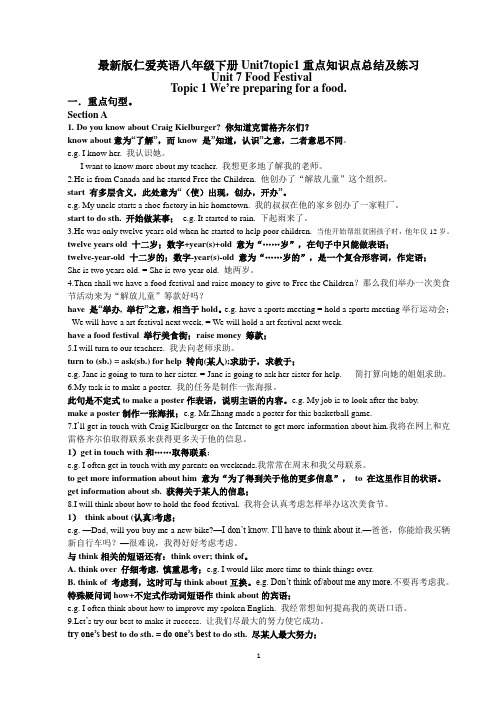
最新版仁爱英语八年级下册Unit7topic1重点知识点总结及练习Unit 7 Food FestivalTopic 1 We’re preparing for a food.一.重点句型。
Section A1.Do you know about Craig Kielburger? 你知道克雷格齐尔们?know about意为“了解”,而know 是”知道,认识”之意,二者意思不同。
e.g. I know her. 我认识她。
I want to know more about my teacher. 我想更多地了解我的老师。
2.He is from Canada and he started Free the Children. 他创办了“解放儿童”这个组织。
start 有多层含义,此处意为“(使)出现,创办,开办”。
e.g. My uncle starts a shoe factory in his hometown. 我的叔叔在他的家乡创办了一家鞋厂。
start to do sth. 开始做某事;e.g. It started to rain. 下起雨来了。
3.He was only twelve years old when he started to help poor children. 当他开始帮组贫困孩子时,他年仅12岁。
twelve years old 十二岁;数字+year(s)+old 意为“……岁”,在句子中只能做表语;twelve-year-old 十二岁的;数字-year(s)-old 意为“……岁的”,是一个复合形容词,作定语;She is two years old. = She is two-year old. 她两岁。
4.Then shall we have a food festival and raise money to give to Free the Children?那么我们举办一次美食节活动来为“解放儿童”筹款好吗?have 是“举办, 举行”之意,相当于hold。
仁爱版八年级下册英语unit-7-topic1教案
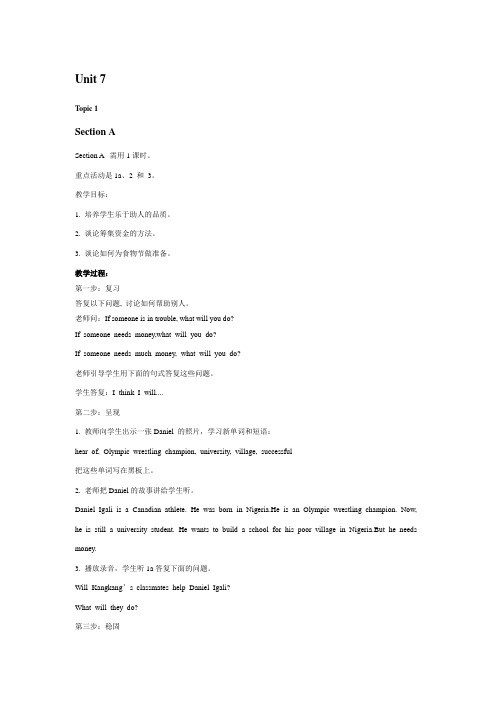
Unit 7Topic 1Section ASection A 需用1课时。
重点活动是1a、2 和3。
教学目标:1. 培养学生乐于助人的品质。
2. 谈论筹集资金的方法。
3. 谈论如何为食物节做准备。
教学过程:第一步:复习答复以下问题, 讨论如何帮助别人。
老师问:If someone is in trouble, what will you do?If someone needs money,what will you do?If someone needs much money, what will you do?老师引导学生用下面的句式答复这些问题。
学生答复:I think I will....第二步:呈现1. 教师向学生出示一张Daniel 的照片,学习新单词和短语:hear of, Olympic wrestling champion, university, village, successful把这些单词写在黑板上。
2. 老师把Daniel的故事讲给学生听。
Daniel Igali is a Canadian athlete. He was born in Nigeria.He is an Olympic wrestling champion. Now, he is still a university student. He wants to build a school for his poor village in Nigeria.But he needs money.3. 播放录音,学生听1a答复下面的问题。
Will Kangkang’s classmates help Daniel Igali?What will they do?第三步:稳固1. 播放录音,让学生跟读并模仿。
2. 读1a对话,完成1b。
3. 两人一组活动,老师把重点句型写在黑板上,让学生看着表演1a的对话。
完成1c。
Unit7Topic1SectionA教案1
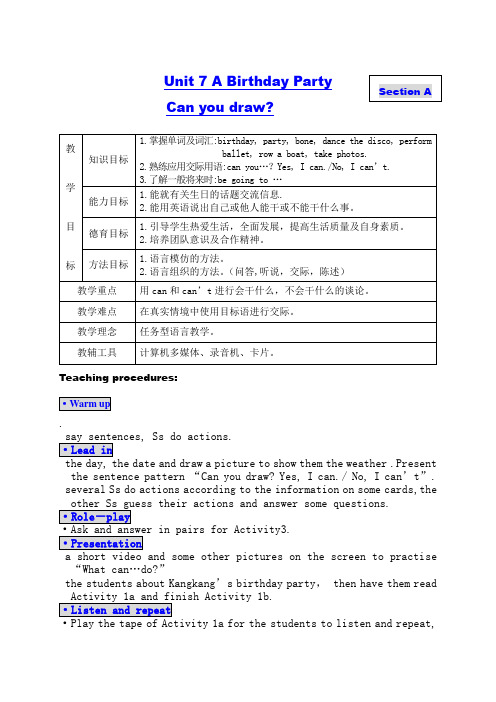
then get them to practise reading it. ·Discussion ·Ss discuss what they can do at the party in groups of four ·Share their ideas in class. ·Listen and answer ·Ss listen to the tape of Activity 2 and fill in the chart, then
·Make a survey﹕What can their best friends do?
·Ask and answer in pairs for Activity3. ·Presentation a short video and some other pictures on the screen to practise
“What can…do?” the students about Kangkang’s birthday party, then have them read Activity 1a and finish Activity 1b. ·Listen and repeat ·Play the tape of Activity 1a for the students to listen and repeat,
Unit 7 topic 1 重点知识点总结

Unit 7 Topic 1 Section A1.Do you know about Craig Kielburger? 你知道克雷格齐尔伯格?know about意为“了解”,而know 是”知道,认识”之意,二者意思不同。
如:I know her. 我认识她。
I want to know more about my teacher. 我想更多地了解我的老师。
2. He is from Canada and he started Free the Children. 他创办了“解放儿童”这个组织。
start有多层含义,此处意为“(使)出现,创办,开办”。
如:My uncle starts a shoe factory in his hometown. 我的叔叔在他的家乡创办了一家鞋厂。
start to do sth.开始做某事;如:It started to rain. 下起雨来了。
3. He was only twelve years old when he started to help poor children. 当他开始帮组贫困孩子时,他年仅12岁。
twelve years old十二岁;数字+year(s)+old 意为“……岁”,在句子中只能做表语;twelve-year-old 十二岁的;数字-year(s)-old 意为“……岁的”,是一个复合形容词,作定语;4. Then shall we have a food festival and raise money to give to Free the Children?那么我们举办一次美食节活动来为“解放儿童”筹款好吗?(1) have 是“举办, 举行”之意,相当于hold。
have a food festival =hold a food festival 举行美食节;如:have a sports meeting = hold a sports meeting举行运动会;(2) Shall I/we …? 在提供帮助、提出建议、要求给予和征求意见时,用Shall I/we …?句型,意为“我(们)……,好吗?”如:Shall I open the window? 我把窗户打开好吗?【链接】①May I …? 常用于征求对方的意见,意为“我可以……吗?”。
仁爱英语七年级下册-最新版Unit-7-Topic-1-Section-A

slow borrow enough row blow own
Summary
Learn how to express 12 months in English. Learn how to read different years. Learn the past simple tense with “was/were”.
语法加油站
总结本单元的语法知识,你掌握了吗
一般疑问句:Was (Were) +主语+宾语 如: Were you ill yesterday? (你昨天病了吗?) 肯定回答: Yes, I was. (是的,我病了。) 否定句: No, I wasn't. (不,我没病。) 特殊疑问句: 特殊疑问词+was (were) +主语+宾语 如:When were you born? 你是什么时候出生的?
100 hundred 1000 thousand
Read the first six years .
1900 nineteen hundred 1840 eighteen forty 1904 nineteen o four 1976 nineteen seventy-six 2000 two thousand 2008 two thousand and eight
key points
• 3.know/know of/know about知道,了解 • 4.----When was she born,do you know?你
知道她什么时候出生的? • ----She was born in July,1965.她出生在
1965年7月. • (1)was是be动词的过去式之一,用于一般
新仁爱版八年级英语下册unit7Topic1sectionA教案
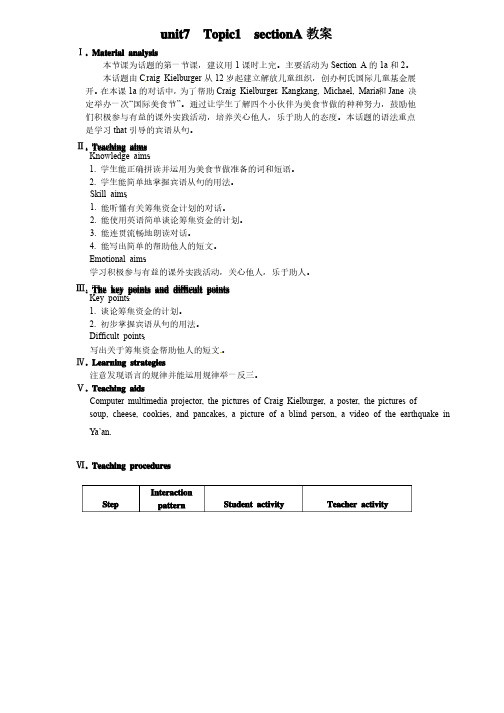
unit7 Topic1 sectionA 教案Ⅰ. Material analysis本节课为话题的第一节课,建议用1课时上完。
主要活动为Section A 的1a 和2。
本话题由C raig Kielburger 从12岁起建立解放儿童组织,创办柯氏国际儿童基金展开。
在本课1a 的对话中,为了帮助Craig Kielburger ,Kangkang, Michael, Maria 和Jane 决定举办一次“国际美食节”。
通过让学生了解四个小伙伴为美食节做的种种努力,鼓励他们积极参与有益的课外实践活动,培养关心他人,乐于助人的态度。
本话题的语法重点是学习that 引导的宾语从句。
Ⅱ. Teaching aims Knowledge aims :1. 学生能正确拼读并运用为美食节做准备的词和短语。
2. 学生能简单地掌握宾语从句的用法。
Skill aims :1. 能听懂有关筹集资金计划的对话。
2. 能使用英语简单谈论筹集资金的计划。
3. 能连贯流畅地朗读对话。
4. 能写出简单的帮助他人的短文。
Emotional aims :学习积极参与有益的课外实践活动,关心他人,乐于助人。
Ⅲ. The key points and difficult points Key points :1. 谈论筹集资金的计划。
2. 初步掌握宾语从句的用法。
Difficult points :写出关于筹集资金帮助他人的短文。
Ⅳ. Learning strategies注意发现语言的规律并能运用规律举一反三。
Ⅴ. Teaching aidsComputer Computer multimedia multimedia multimedia projector, projector, projector, the the the pictures pictures pictures of of of Craig Craig Craig Kielburger, Kielburger, Kielburger, a a a poster, poster, poster, the the the pictures pictures pictures of of soup, cheese, cookies, and pancakes, a picture of a blind person, a video of the earthquake in Ya’an.Ⅵ. Teaching proceduresStep Interaction patternStudent activity Teacher activityIntroduction (8 minutes)1. The whole class work. 2. The whole class work. 3. Group work. 4. The whole class work. 5. The whole class work. 1. Focus their attention on the teacher. 2. Students read the passage passage about about about the the the traffic traffic rules rules they they they made made made after after class. 3. Students discuss in groups and ans w er the wer the questions with the structure: I think Iwill…4. Students learn and grasp the new words and phrases with the help of the teacher. 5. Students report the information about Craig Kielburger they collected. 1. Greet students ready for learning. 2. Teacher asks the students to to report report report the the the homework. homework. Let Let the the the students students students read read read the the passage passage about about about the the the traffic traffic rules they made after class. 3. Teacher asks the students to think about the following questions: If someone isin trouble, what will youdo? If someone needs money,what will you do? Then ask the studen ts to answer them with the structure: I think I will…4. 4. Teacher Teacher Teacher teaches teaches teaches the the the new new words by summing up the answers above: “Now Now I I I see, see, see, some some some students students will turn to their their parents, parents, which means they will ask their parents for help. Some students imaginethat they can put on a play to to raise raise raise money. money. money. Y ou Y ou can can try your best to help others, others, I’m I’m I’m so so so proud proud proud of of you!”5. 5. Teacher Teacher Teacher shows shows shows the the the pictures pictures o f Craig Kielburger to the students. Ask the students to to report report report the the the information information about Craig Kielburger they collected. Presentation (10 minutes) 1. The whole class work. 2. Individual work. 3. The whole class work. 4. Individual work. 5. The whole class work. 6. The whole class work. 7. Individual work. 8. The whole class work. 9. Individual work. 10. The whole class work. 1. Students look at the picture of 1a, and understand understand the the the picture picture with the help of the information under it. 2. Students watch the flash, and then mark the sentences of 1b wi th T or F. 3. Students check the answers. 4. Students read the conversation and match the information of 1c. 5. Students check the answers. 6. Students read the sentences aloud. 7. Students find out the same same structure structure structure in in in the the sentences of 1c. 8. Students check the answers. 9. Students watch the flash flash and and and answer answer the questions. 10. Students check the answers. 1. T eacher praises students’ information they collected after after class. class. class. Encourage Encourage Encourage them them to keep on making a preview before before class. class. class. Then Then Then let let let the the students students look look look at at at the the the picture picture of of 1a 1a 1a and and and undund erstand erstand the the picture picture with with with the the the help help help of of of the the information under it. 2. Teacher plays the flash of 1a. Ask the students to watch watch the the the flash, flash, flash, and and and then then mark mark the the the sentences sentences sentences of of of 1b 1b with T or F. 3. Teacher asks two students to tell the answers. 4. Teacher asks the students to to read read read the the the conversation conversation and match the information of 1c. 5. Teacher asks two students to tell the answers.6. Teacher asks the students to read the sentences aloud. 7. Teacher asks the students to find out the same structure in the sentences of 1c. 8. Teacher asks two students to tell the answers. 9. Teacher asks the students to watch the flash again and answer the following questions: (1) How many schools did Free the Children build? (2) What’s Michael’s task?10. Teacher asks two students to tell the answers. Teach the new word p osterposter by showing a real poster to them. Consolidation (10 minutes) 1. The whole class work. 2. The whole class work. 3. Group work. 4. The whole class work. 5. Group work. 6. The whole class work. 7. The whole class work. 1. Students read the conversation after the recording sentence by sentence. 2. Students try to follow the speed, paying attention to the pronunciation and intonation. 3. Students discuss in groups groups to to to find find find out out out the the difficult difficult points points points and and and sum sum up the main points. 4. 4. Students Students Students underline underline underline in in their books and make some notes. Learn and grasp grasp the the the new new new words words and phrases. 5. Students discuss in groups: What will the food festival be like? 6. V olunteers report the result of the discussion. 7. Students act out the conversation of 1a. 1. Teacher plays the recording sentence by sentence. 2. Teacher plays the recording without stopping. 3. Teacher asks the students to learn in groups to find out the difficult points in the conversation. At last let them sum up the main points of the conversation. 4. 4. T eacher T eacher makes makes makes a a a summary summary to to explain the key points and explain the key points and difficult points to the students. (1) have/hold/ organize a food festival (2) turn to sb. /ask sb. for help (3) make a poster (4) get in touch with sb. (5) try one’s best to do sth. (6) make it a success (7) 由that 引导的宾语从句引导的宾语从句5. T eacher lets the students read 1a, and then discuss what the food festival will be like with the the help help help of of of the the the pictures pictures pictures and and the example. Let them practice the usage of the object clauses. 6. Teacher asks four students to report the result of the discussion. Finish 1d. 7. T eacher asks the students to act out the conversation of 1a. Practice (10 minutes) 1. The whole class work. 2. Group work. 3. Individual work. 4. The whole class work. 5. Pair work. 6. Individual work. 7. The whole class work. 1. Students learn and grasp the new words with the help of the teacher. 2. Students discuss what the children children should should should prepare prepare for for the the the food food food festival festival festival in in groups. 3. Students write down the conversations. 4. Students evaluate the conversations, conversations, and and and then then check check the the the answers answers answers with with the teacher. 5. Students act out the conversations in pairs. 6. Students listen and match match the the the people people people with with what we can do. 7. Students check the answers. 1. Teacher teaches the new words soup, cheese, cookies,and pancakes by by showing showing their pictures on the screen. Teach set and set the tableby explaining their Chinese meaning. 2. Teacher asks the students to discuss what the children should prepare for the food festival. 3. Teacher asks four students to write down the conversations on the blackboard. The other students write down at least two conversations in their each workbook. 4. 4. Teacher Teacher Teacher lets lets lets two two two or or or three three students evaluate the conversations on the blackboard. Check the answers. 5. Teacher lets the students act act out out out the the the conversations conversations in pairs. 6. 6. Teacher plays the recording Teacher plays the recording of of 3 3 3 for for for the the the students students students and and lets the students listen and match the people with what we can do. 7. 7. Teacher Teacher Teacher lets lets lets two two two students students tell tell their their their answers. answers. answers. Teach Teach blind by showing a picture of a blind person. Production (7 minutes) 1. Group work. 2. The whole class work. 3. The whole class work. 4. The whole class work. 5. Individual work. 1. Students watch the video and discuss in groups. 2. Students write down their opinions with the structure I think…3. Students share their opinions with with the the whole class. 4. Students summarize Section A with the teacher. 5. Students finish the homework after class. 1. Teacher plays the video of the Ya’an earthquake. Lead the students to discuss in groups: “A terr“A terrible earthquake ible earthquake struck Ya’an in Sichuan Province at 8: 02 on the morning of April 20th this year. Le t’s discuss how to help the p eople in Ya’an.”people in Ya’an.”2. Teacher asks the students to write down their opinions with the structure Ithink…3. Teacher asks four students from different groups to share their opinions. Tell them that we should try our best to help the people in trouble. 4. Teacher shows the summary of this section to the students. 5. Teacher assigns homework: (1) Review the summary after class. (2) Write down a passage about how to help the the people people people in in in Y Y a’an with the sentences containing object clauses. (3) Search some typical foods in different countries to prepare for Section B. Teaching Reflection The students a dmire Craig Kielburger very much. It’s a successful admire Craig Kielburger very much. It’s a successful lesson: lesson: The The The students students students want want want to to to learn learn learn from from from him him him to to to help help help the the the people people people in in trouble. The teacher should introduce more information of Craig Kielburger to the students to encourage them to help others from now on. Ⅶ. Blackboard designUnit 7 Food Festival Topic 1 We’re preparing for a food festival. Section A 1. have/hold/ organize a food festival 2. turn to sb. /ask sb. for help 3. make a poster 4. get in touch with sb. 5. try one’s best to do sth.6. make it a success 7. Kangkang knows (that) Graig comes from Canada. 8. set the table 。
初中英语七年级Unit7 Topic 1Section A 教学设计
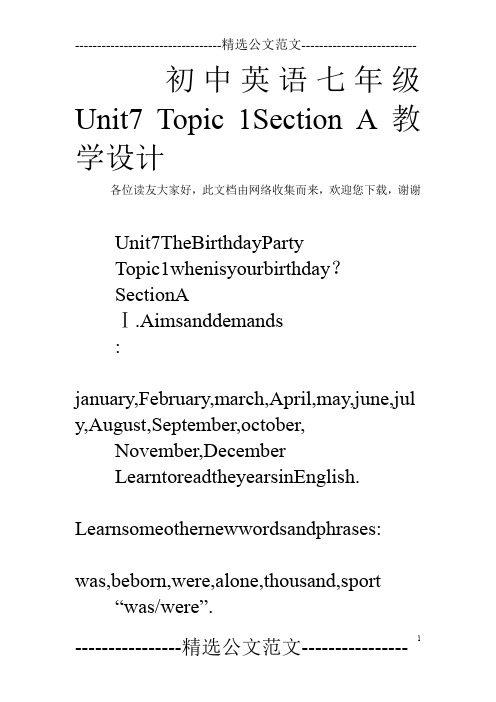
初中英语七年级Unit7 Topic 1Section A 教学设计各位读友大家好,此文档由网络收集而来,欢迎您下载,谢谢Unit7TheBirthdayPartyTopic1whenisyourbirthday?SectionAⅠ.Aimsanddemands:january,February,march,April,may,june,jul y,August,September,october,November,DecemberLearntoreadtheyearsinEnglish. Learnsomeothernewwordsandphrases: was,beborn,were,alone,thousand,sport “was/were”.whenwasheborn,doyouknow?Hewasbornin june,1985.wherewasheborn?Inmaryland, whenwereyouborn?Iwasborninjanuary,199 7.Ⅱ.Teachingaids:身份卡片/课本图片/录音机/日历表Ⅲ.TeachingPlanStep1Review1.T:Let’ssingHappyBirthdaytogether. T:DoyouknowwhywesingHappyBirthday? BecausenextThursdayiskangkang’sbirthday.birthday生日T:weshouldsay“Happybirthdaytoyou,kang kang!”(引入本课标题并板书。
)T:?Ss:Seven.T:HowmanydaysarethereinFebruary?Ss:Thereare28or29days.T:?Ss:Twelve.Step2Presentation教师准备一幅有12个月份的日历呈现给学生,教授月份和年份,即呈现1b 和3a。
仁爱英语八年级下Unit7Topic1SectionA课文英汉互译重点短语重难句详解

Unit 7Topic1 Section A课文英汉对照,重要短语及重难点句详解一. 课文英汉对照Jane: Do you know about Craig Keilburger?简:你了解克雷格.其尔伯格吗?Kangkang: Yes. He is from Canada and he started Free the Children.康康:是的,他来自加拿大,创办了“解放儿童”这个组织。
Michael:He was only 12 years old when he started to help poor children. 迈克尔: 他开始帮助贫困孩子时年仅12岁。
Maria: Yes. Free the children has built over 700 school rooms in many countries.玛利亚: 是的。
“解放儿童”在许多国家建立了学校,有700多所。
Jane:Young people like us raised the most of the money.像我们这样的年轻人筹集了大部分的资金。
Kangkang: Really? Then shall we have a food festival and raise money to give to Free the Children?真的吗?那么我们举办一次美食节活动来为解放儿童筹款好吗?Jane: Good idea. They are trying to build a school in Kenya. When and where shall we have the food festival?好主意。
他们正在想为肯尼亚建一所学校,我们什么时候在哪儿举办美食节呢?Kangkang: I think we can have it on our school playground on Sunday.我认为我们可以星期天在学校的操场上举办。
八年级英语下册 Unit7 Topic1单词和配套练习 仁爱版
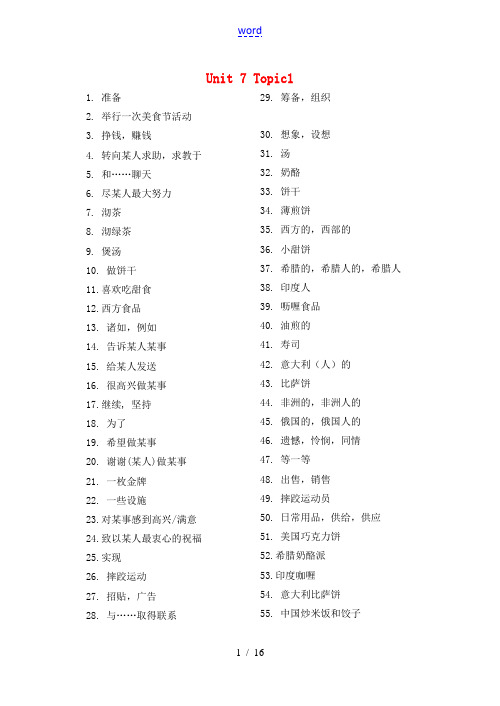
wordUnit 7 Topic11. 准备2. 举行一次美食节活动3. 挣钱,赚钱4. 转向某人求助,求教于5. 和……聊天6. 尽某人最大努力7. 沏茶8. 沏绿茶9. 煲汤10. 做饼干11.喜欢吃甜食12.西方食品13. 诸如,例如14. 告诉某人某事15. 给某人发送16. 很高兴做某事17.继续, 坚持18. 为了19. 希望做某事20. 谢谢(某人)做某事21. 一枚金牌22. 一些设施23.对某事感到高兴/满意24.致以某人最衷心的祝福25.实现26. 摔跤运动27. 招贴,广告28. 与……取得联系29. 筹备,组织30. 想象,设想31. 汤32. 奶酪33. 饼干34. 薄煎饼35. 西方的,西部的36. 小甜饼37. 希腊的,希腊人的,希腊人38. 印度人39. 呖喱食品40. 油煎的41. 寿司42. 意大利(人)的43. 比萨饼44. 非洲的,非洲人的45. 俄国的,俄国人的46. 遗憾,怜悯,同情47. 等一等48. 出售,销售49. 摔跤运动员50. 日常用品,供给,供应51. 美国巧克力饼52.希腊奶酪派53.印度咖喱54. 意大利比萨饼55. 中国炒米饭和饺子56. 日本寿司58. 俄罗斯黑面包57. 南非咖喱牛肉Unit 7 Topic1AMaria: We know Daniel Igali wants to build a new school for his poorvillage in Nigeria.Jane: I think money must be a problem for him.K(Kangkang): Shall we 1 to raise money for his school?Jane: Good idea! 2 haveit?K: I think we can have it on our school playground on Sunday.Maria: I will 3 .Michael: My task is to make a poster.K: Go od! I’ll 4 Daniel on the Internet to get more information abouthim.Jane: I will think about how to organize the food festival.Maria: Great! Let’s 5 to make it successful.BJane: Hello, Michael! 1 cook for the foodfestival?M(Mi chael): I’m thinking about that. 2 ,and I think a lot of students will buy western food, such as Americanchocolate cookies and Greek cheese pies.Jane: Wow! That’s a good idea. I like Indian food, so I 3 Indian curries.K(Kangkang): Wonderful! I think Chinese fried rice and Japanese sushiare easy to cook. 4 , I’m sure that fried rice anddumplings will be popular.Maria: You’re right. But what should I serve, Italian pizza, South African beef curry or Russian black bread?K: I think beef curry is OK.M: That’s good enough. I believe we’ll 5 for Daniel Igali.CO(Operator): Hello! No.37 High School.K(Kangkang): Hello! Extension 6006, please.O: OK. 1 , please.U(Uncle Yang): (A few seconds later) Hello!K: Hello! Uncle Yang, this Kangkang.U: 2 ? Kangkang?K: We’re going to have an international food festival to raise money for a village school in Nigeria.3 ?U: What a surpris e! I’d love to. 4 ? K: On our school playground on May 16th. It’s Sunday. You must e to our food festival.U: OK. I’m pleased to hear that. 5 , Kangkang!Unit 7 Topic 1 Section AI.根据首字母提示填空1. Can I have another bowl of chicken s?2. He ordered an Italian c pizza.3. You can i how useful the fax machine is.4. He lives in a small v far away from the city.5. P is a kind of thin, dry cake.II.选择题1. Tomorrow I will get in touch my friends the Internet.A. at, inB. with, onC. to, onD. to, through2. He tries his best English well.A. to learnB. learnC. learningD. learns3. I think she will be here soon.A. whenB. while c. that D. if4. He is my good friend and I him.A. know aboutB. know ofC. knowD. know from5. I turn to our teachers when I’m in trouble.A. WillB. ShallC. WouldD. Would like6. I’m a new er, so I ask the driver go there.A. how toB. where toC. when toD. what toIII.从II 栏中找出与I栏相对应的答语I( ) 1. Do you know about him?( ) 2. Shall we have a party next Sunday?( ) 3. Do you think the children need to make cheese pies? ( ) 4. When and where shall we meet?( ) 5. How do you chat with your friends?IIA. No, I don’t think so.B. At the school gate tomorrowmorning.C. On the Internet.D. No, I don’t.E. Good idea!Section BI.用方框中所给单词的适当形式填空1. Everyone for the sports meet at the moment.2. Peter doesn’t like to eat curries.3. cultures are different from those in the east.4. I often invited my friends dinner.5. Would you like me up later on?6. chicken is very popular in America.7. — Thank you very much.. — It’s a .II.选择题1. What would you like to cook the food festival?A. onB. ofC. forD. at2. I often my hometown when I am in Beijing.A. think overB. think aboutC. thinkD. think of3. The book is for children to read. There are few new words in it.A. enough easyB. easy enoughC. enoughdifficultD. difficultenough4. We should the people.A. serve forB. serve toC. serveD. serve at5. —I’m sorry I lost your pen. —I have another one.A. Never mind.B. You’re weleC. That’s rightD. You must pay for it6. —I missed the wonderful sports meeting last week. —.A. How nice it is!B. I’m so sorry!C. What a pity!D. Sounds great!7. I her again three years later.A. will meetB. metC. am going to meetD. meet8. —Would you like to e to my party this Saturday?— Sure, .A. I’m afraid notB. but I’m sorry I can’tC. that’s good enoughD. I’d love toSection CI.根据汉语提示填空1. When it rains, the children in the classroom(全身淋湿)2. They are going to (举办美食节) next month.3. — Hello! Could I speak to Tom, please?—(请稍等)), please. He is ing soon.4. You are making progress. (继续努力)the good work., Kangkang.5. Wele to our store! We have many different things(出售).II.选择题1. — Hello! . — Just a minute.A. That is Li Ming.B. Can I speak to Mrs. Wang, please?C. Who is this?D. I am Mr. Han.2. Thank you me the news.A. to tellB. to tellingC. for tellD. for telling3. I’m very to see you again.A. pleaseB. pleasureC. pleasedD. pleasing4. The worker works hard make a lot of moneyA. in orderB. in order toC. on order thatD. so that5. Don’t stop. Please keep .A. runningB. runC. to runD. runs6. — We should do something to help the poor children. What about money for them? — That would be very nice.A. raiseB. riseC. raisingD. rising7. — We’ll have an Englishevening party on Christmas day. May Iinvite you to e? —I’d love to.A. How surprised!B. How bored!C. How boring!D. What a surprise!8. The school in my village has only a few school .A. suppliesB. supplyC. supplyingD. to supplyIII.从方框中选择适当的选项补全对话T(Tony): Hello, Nancy!N(Nancy): Hi, Tony! T: 1 ?N: I Think so. What ’s up?T: 2 ? There ’s a new restaurant near the station.N: I’d love to, but I’m sorry I can ’t. 3 .T: Oh, that ’s too bad. 4 ?N: Sunday? Let me see. Yes, I think I will be free.T: Great. When shall we meet?N: At six o ’clock, OK? T: Sounds great. 5 .N: All right. See you then.T: See you.IV .完形填空When Italians talk about their cooking to foreigners, they always think of pizza 1 . But today ’s pizza is different 2 the old ones. In the past, it was hard to make pizza. 3 years went by, the 4 used a new way to make pizza. Then it was 5 to make pizza.A long time ago, there were several kingdoms in Italy. 6 , they became one country. During this time, Italians got some new ideas 7 cooking. The most interesting idea was to make pizza. The first pizza was not so delicious and did not look nice. 8 the cooks in Italy tried to make it better. Then this kind of food began to look nice and taste delicious soon it became popular around the country. Most people liked it because it was 9 , nourishing (富有营养的),simpleto make and nice to eat.Now Americans eat more pizza than 10 do every day. Maybe many people in China are enjoying pizza as a meal. Do you like it?1. A. first B. firstly C. for the first time D. at first2. A. / B. with C. from D. in3. A. With B. From C. In D. As4. A. cook B. cooks C. cooker D. cookers5. A. easiest B. easier C. easily D. more easily6. A. Later B. Latest C. Late D. Lately7. A. on B. for C. as D. by8. A. But B. Because C. Why D. So9. A. dear B. cheap C. dearer D. cheaper10. A. Chinese B. Italians C. Australians D.JapaneseSection DI.根据首字母或汉语提示填空1. May I i you to my birthday party?2. We can s many kinds of cookies to customers in our restaurant.3. I wish your food festival a big s!4. I’m afraid he (没空).5. Let’s make his dream (实现).II.用所给单词的适当形式填空1. Thank you for (help) me with my English.2. Let’s try our best (not make) our teacher angry.3. What about (buy) a sandwich for him?4. You can make an (invite) to them.5. Five minutes later he (leave) for Beijing.III.选择题1. Look! The little baby his mother.A. looksB. looks likeC. likeD. is looking2. He imagined basketball with Tom on the playground.A. playB. playedC. playingD. to play3. Keep , and you will be .A. to try, successB. trying, successC. to try, successfulD. trying, successful4. — This is Xiao Wu speaking. Is Tom in? — the line, please.A. HoldB. KeepC. GetD. Take5. — I’m pleased his work. What about you? — I’m proud him.A. with, withB. at, aboutC. with, ofD. about, for IV.阅读理解根据广告内容,完成下列各题1. The Happy Holiday Hotel stands at .2. Maria wants a double room for three days at Blue Sky Hotel, so she should pay .3. Restaurants at the Happy Holiday Hotel open .4. If Maria wants to ride a horse, she should call .5. The double rooms at the Blue Sky Hotel are more expensive because they have .Unit 7 Topic 1 自测题I.词汇A.根据汉语提示填空1. Can you sing a song in (俄语).2. We have lots of (学校用品)here.3. The lazy boy passed the exam. What a (令人吃惊的).4. Mary studies hard (为了)go to college.5. The students are (为……做准备)theirEnglishpetition.B.选出与句中画线部分意思相同或相近的选项6. Hold the line, please.A. Wait for meB. Hold onC. Hands upD. Write a message7. Shall we have a food festival?A. hasB. hadC. holdD. held8. Let’s try our best to study English well.A. doB. makeC. didD. made9. I shall turn to our teachers.A. help our teachersB. turn to helpC. ask our teacher for helpD. help myself10. Ihave a sweet tooth.A. have a good toothB. like eating sweet foodC. make my tooth sweetD. like my teethII.选择题1. That crying baby is to see his mother.A. pleaseB. pleasingC. pleasesD. pleased2. Mary tells her mother she will her a letter when she gets to London.A. sendB. send forC. send offD. send out3. I believe we’ll raise a lot of money for Daniel Igali.A. thatB. whatC. ifD. when4. He works hard and tries his best to make his dream .A. e onB. e outC. e trueD. e over5. The twins are making a for the food festival.A. postB. posterC. inviteD. invitation6. Linda plans to cook pizza.A. ItaliansB. ItalyC. ItaliesD. Italian7. I’m thinking about to do on New Year’s Day.A. howB. whatC. whenD. where8. This village school is very small and has few .A. classroomB. deskC. supplyD. supplies9. Mary decide go shopping with her parents.A. not toB. didn’tC. doesn’tD. isn’t to10. When it rained, we all wet.A. becameB. turnedC. changedD. got11. I’m very pleased with you will do for me.A. whatB. whereC. whenD. how12. Would you like to have dinner with me ?A. in this Sunday eveningB. on this Sunday eveningC. at this Sunday eveningD. this Sunday evening13. Please give my to your friends.A. hopeB. wishC. hopesD. wishes14. The maths problem is a little difficult. Please .A. think of itB. think it ofC. think it overD. think over itIII.从方框中选择适当的选项补全对话Ann: Good afternoon, Tom!Tom: Good afternoon. I’m glad that you have e on time.Ann: Happy birthday to you, Tom 1Tom: Thanks a lot. What’s in it? 2 Oh! Wonderful! Chinese noodles, my favorite food.Ann: Yes, this kind of noodles is made for birthday. We eat noodles on birthday, because they are the symbol(象征)of longevity(长寿). Tom: Is that so? 3Ann: 4 And hope you make more progress(进步)with your study. Tom: 5IV.完形填空An important question about eating out is who pays for the meal. If a friend of yours asks you to have lunch with him, you may say 1 like this, “I’m afraid it’ll have to be someplace 2 , as I have very little money.” The other person may say, “OK, I’ll meet you at McDonald’s.”This means that the two agree to go Dutch, that is, each person pays for himself. He may 3 say, “Oh, no. I want to 4 you to lunch at Smith’s .”or “I want you to try Chinese dumplings there. They’re great.”This means the person wants to pay for both of you. If you feel 5 towards this person, you can go with him and you 6 pay for the meal. You may just say “ 7 . That would be very nice.”American customs(习俗)about who pays for dates(约会)are much the same as those in the other parts of the world. In the old days,American women wanted men to pay for all the meals. But today, a university girl or a woman in8 will usually pay her way during the day. If a man asks her fora dance outside the working hours, it 9 “e as my guest.”S o as you can see, it is a polite thing to make the question 10 at the very beginning.1. A. something B. anything C. everything D. nothing2. A. expensive B. cheap C. quiet D. wonderful3. A. also B. neither C. too D. either4. A. get B. bring C. meet D. take5. A. kind B. friendly C. happy D. lucky6. A. can’t B. needn’t C. mustn’t D. don’t7. A. I’m sorry B. Excuse me C. Thank you D. Pardon8. A. school B. China C. America D. business9. A. goes B. says C. means D. tells10. A. clear B. careful C. clean D. easyV.阅读理解ABob likes to eat spaghetti(意大利面条). Every Friday he goes to an Italian restaurant and eats spaghetti for lunch.Phyllis is a waitress(女服务生)at the Italian restaurant. Phyllis and Bob always talk and laugh. They bee good friends.After Bob ate spaghetti at the restaurant. He paid for his lunch. Then he asked Phyllis, “Do you want a tip today, or do you want half of my lottery ticket(彩票)?”“Half of your lottery ticket?”Phyllis asked. “Yes,”Bob said, “I have a lottery ticket. If I win the lottery, you will get half of the money.”Phyllis laughed. “OK,” she said, “I don’t want a tip today.I want half of the lottery money!” She laughed again.The next day, Bob won the lottery. He won six million dollars. Bob went to the Italian restaurant. “Here is your tip,” Bob told Phyllis.1. Where does Bob go every Friday?A. To his friend’s restaurant.B. To an Italian restaurant.C. To his friend’s house.D. To a restaurant to talk with his friend.2. Who is Phyllis?A. Bob’s friend.B. Bob’s wife.C. A waitress.D. Both A and C.3. How much money did Bob give to Phyllis?A. 3,000,000 dollars.B. 300,000 dollars.C. 6,000,000 dollars.D. Some of the money.4. From the last passage, we know Bob is .A. smartB. honestC. luckyD. happy5. Which of the following is TRUE?A. Bob eats spaghetti for lunch every day.B. Bob gives Phyllis money to buy lottery ticket.C. If Bob doesn’t win the lottery, Phyllis won’t get the tip for that day.D. Phyllis doesn’t want the tip because they’re friends.BDo you know the benefits(益处)of potatoes? 12 Africa is the hometown of potatoes. Later potatoes were grown all over the world. First people only ate them uncooked. 34 Men and women, young and old enjoy eating them very much. It is said that potatoes can be cooked into 400 kinds of cooked vegetables.In the past some people thought they could make people fat and were afraid of eating them too often. But in fact, they do not make people fat but keep people thin. 5根据短文内容,用选项把空缺的句子还原A. As the time passed, people learned to cook them deliciously.B. It is nearly the king of all vegetables and all foods.C. Now potatoes have bee delicious food or cooked vegetables at table.D. So you can enjoy them as often as possible if you like,E. As we know, people were first grown in Africa.Unit 7 Topic1 参考答案Section AI. 1. soup 2. cheese 3. imagine 4. village 5. PancakeII. 1. B 2. A 3. C 4. A 5. B 6. AIII. 1. D 2. E 3. A 4. B 5. CSection BI. 1. is preparing 2. Indian 3. Western 4. to have5. to call6. Fried7. pleasureSection CI. 1. all get wet 2. hold/have a food festival 3. Hold on4. Keep up5. for saleII. 1. B 2. D 3. C 4. B 5. A 6. C 7. D 8. AIII. 1. C 2. E 3. D 4. A 5. BIV. 1. A 2. C 3. D 4. B 5. B 6. A 7. A 8. D 9. B 10. B Section DI. 1. invite 2. supply 3. success 4. has no time 5. e true II. 1. helping 2. not to make 3. buying 4. invitation 5. left III. 1. B 2. C 3. D 4. A 5. CIV. 1. Tianchang Road 2. 120 yuan/¥120 3. 24 hours4. 0858-********5. bathroomsUnit 7 Topic 1 自测题I. A. 1. Russian 2. school supplies 3. surprise 4. in order to5. preparing forB. 6. B 7. C 8. A 9. C 10. BII. 1. D 2. A 3. A 4. C 5. B 6. D 7. B 8. D 9. A10. D 11. A 12. D 13. D 14. CIII. 1. C 2. A 3. E 4. D 5. BIV. 1. A 2. B 3. A 4. D 5. B 6. B 7. C 8. D 9. A 10. AV. A. 1. B 2. D 3. A 4. B 5. CB. 1. B 2. E 3. A 4. C 5. D。
仁爱英语七年级下册unit7 topic1 SectionA导学案
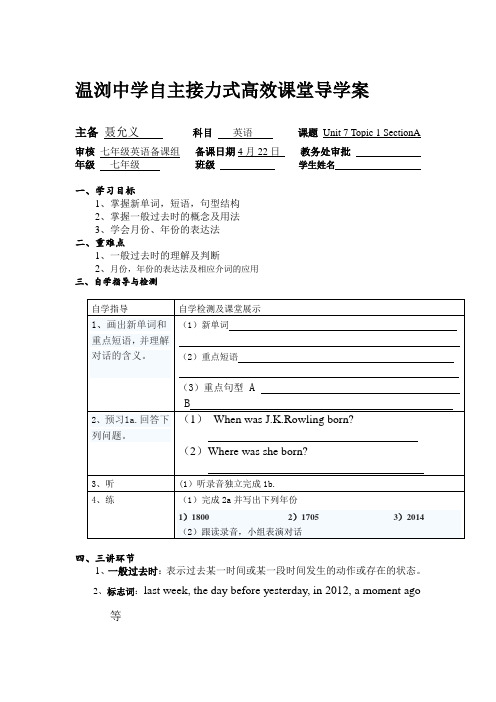
温浏中学自主接力式高效课堂导学案主备 聂允义 科目 英语 课题 Unit 7 Topic 1 SectionA 审核 七年级英语备课组 备课日期4月22日 教务处审批 年级 七年级 班级 学生姓名一、学习目标1、掌握新单词,短语,句型结构2、掌握一般过去时的概念及用法3、学会月份、年份的表达法二、重难点1、一般过去时的理解及判断2、月份,年份的表达法及相应介词的应用三、自学指导与检测四、三讲环节1、一般过去时:表示过去某一时间或某一段时间发生的动作或存在的状态。
自学指导 自学检测及课堂展示1、画出新单词和重点短语,并理解对话的含义。
(1)新单词(2)重点短语 (3)重点句型 AB2、预习1a.回答下列问题。
(1) When was J.K.Rowling born?(2)Where was she born?3、听(1)听录音独立完成1b. 4、练 (1)完成2a 并写出下列年份1)1800 2)1705 3)2014(2)跟读录音,小组表演对话2、标志词:last week, the day before yesterday, in 2012, a moment ago等3、be的一般过去式am/ is→was are→were↓↓否定式否定式wasn’t weren’t(3) 一般疑问句和特殊疑问句的变化规则4、be born 的用法be born + in +年份、月份be born + on +具体某一天、具体某一天的上午、下午或晚上5、年份的读法:A.年份用基数词来读,一般情况是两位两位读。
如:1876年读作2030年读作_____________B.年份的其他读法。
如:1900年读作_____________ 2000年读作_____________2008年读作_____________ 1902年读作_____________五、学力提升A层次写出12个月的英文表达用英语表达下列年份1.16622.19403.17004.20085.2014年4月6、2016B层次( ) 1. When you born?A. areB. isC. wasD. Were( ) 2. Tomorrow is birthday.A. Mary mother’sB. Mary’s motherC. Mary’s mother’sD. Mary mother( ) 3. — Were you born in Beijing?—. I was born in Shanghai.A. Yes, I amB. No, I’m notC. Yes, I wasD. No, I wasn’t C.层次Kate was born in England.(改为一般问句) (对下划线部分提问)。
七年级英语Unit 7:Celebrating the Birthday Topic 1 Section A and B湘教版知识精讲

初一英语Unit 7:Celebrating the Birthday Topic 1 Section A and B湘教版【本讲教育信息】一. 教学内容:Unit 7:Celebrating the Birthday .Topic 1:When were you born? (Section A and B)二. 重点、难点:单词:birthday 生日May 五月thirteenth 第十三celebrate 庆祝party 聚会third 第三fourth 第四fifth 第五sixth 第六seventh 第七eighth 第八ninth 第九tenth 第十eleventh 第十一twelfth 第十二twentieth 第二十Saturday 星期六date 日期thousand 千July 七月October 十月December 十二月August 八月were 是born 出生was 是January 一月March 三月April 四月June 六月September 九月November 十一月Spain 西班牙rest 剩余的部分alone 单独的词组:be born plan to do sth. have a look句型:1.May thirteenth2. That’s next Sunday!3. one hundred4. When were you born ?5. She was born on October 22nd ,1996.6. How do you plan to celebrate it?8. When is your birthday , Kangkang?8. What day is it today? It’s Saturday .9. What’s the date today ? It’s May 5th ,2007.10. When were you born? I was born in June,1970.语法:一般过去时和基数词和序数词的用法三. 具体内容:(一)数词的分类1. 基数词表示数目的词称为基数词。
仁爱英语七下Unit7+Topic1+SectionA+教案及教学设计

课题:Unit 7 Topic 1 When is your birthday?Section A授课班级:初一(15)班授课人:李津津一. 学情分析本课题的教学对象为七年级15班的学生,该班大部分学生英语基础水平较弱,对于英语的学习缺乏积极性,班级英语水平两极分化严重。
上课时,虽课堂学习氛围较好,但很少有同学会积极主动举手发言。
英语学习的自信心和积极性还有待提高。
二. 教学内容分析本课是第七单元话题一的第一课时,主要活动是1a和1c。
通过Kangkang 和Michael谈论英国作家J.K.Rowling展开学习,对话主要涉及到J.K.Rowling 的作品、出生地点及出生年月。
通过人物对话,学生将学习关于询问和回答出生年月与地点的表达方式并初步了解be动词的一般过去时;还能通过听、读的练习活动掌握十二个月份的表达法及其书写形式。
三. 教学目标1. Knowledge aims(知识目标)能根据已学语音、音标及发音规则,正确朗读下列词汇并运用于情景对话中: writer, was, were, born, novel, fan能够熟练读表示月份的单词:January, February, March, April, May 等;能够用英语熟练应用关于询问和回答某人的出生地和出生月的表达方式:(1)—Where was/ were ...born?—In…(2) —When was/ were ...born?—…was/ were born in…能够正确使用be动词的一般过去时was/ were。
2. Skill aims (技能目标)能听懂有关月、出生月和出生地点的语段;能根据图文就表达月、谈论出生月和出生地点的表达方式进行简单的交流;能正确地读出十二个月份;能正确地朗读对话,并能注意语音语调。
3. Emotional aims (情感目标)通过单词记忆竞赛,激发学生学习英语兴趣,锻炼其思维能力及反应能力;通过相关活动,培养学生关注名人的生平事迹并向他们学习的习惯。
仁爱版英语七年级下册 Unit 7Topic1 Section A
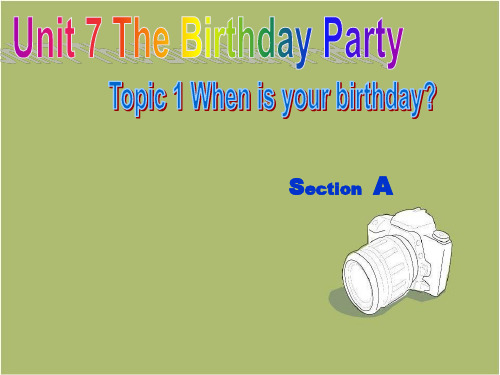
October,1886 Hebei,China
1926 Tongliang,Chongqing,China
October,1929 Hebei,China
October,1932 Shanxi,China
January,1931 Sichuan,China
2b. Listen and write down the year or month in each coversation.
She writes a novel(小说).
播放
She is my faborite writer(作家).
I’m a big fan(粉丝) of her.
What’s her name?
J.K. Rowling.
When was she born?
She was born in July, 1965.
Can you write them in English?
1800_e_i_g_ht_e_e_n_h_u_n_d_r_ed__1820___ei_g_h_te_e_n_t_w_e_n_t_y__ 1903_n_i_n_e_te_e_n_o__th_r_e_e__1996___n_in_e_te_e_n_n_i_n_e_ty_-_si_x 2009_t_w_o__th_o_u_s_a_n_d_a_n_d_n_in_e__ 2050_t_w_o__th_o_u_s_a_n_d_a_n_d_f_if_ty_/_tw_e_n_ty__fi_ft_y__
Where were you born? I was born in…
When was she born? She was born in…
Where was she born? She was born in… May, 2005 Chongqing,China
仁爱版七年级下册 Unit 7 Topic 1 课文翻译
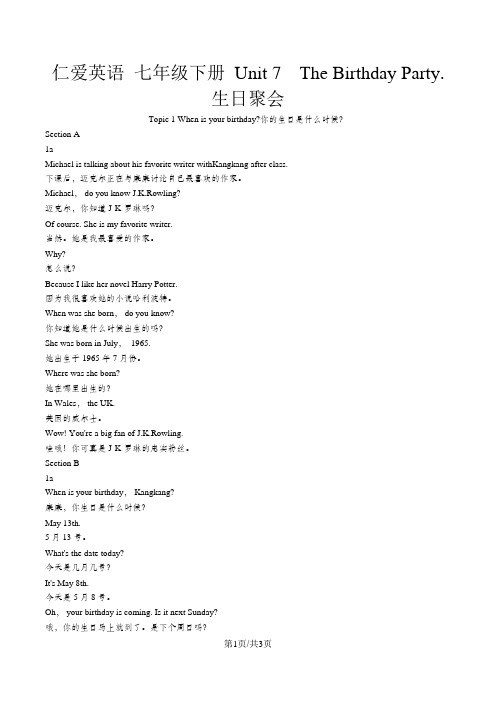
仁爱英语七年级下册Unit 7 The Birthday Party.生日聚会Topic 1 When is your birthday?你的生日是什么时候?Section A1aMichael is talking about his favorite writer withKangkang after class.下课后,迈克尔正在与康康讨论自己最喜欢的作家。
Michael, do you know J.K.Rowling?迈克尔,你知道J·K·罗琳吗?Of course. She is my favorite writer.当然。
她是我最喜爱的作家。
Why?怎么说?Because I like her novel Harry Potter.因为我很喜欢她的小说哈利波特。
When was she born, do you know?你知道她是什么时候出生的吗?She was born in July,1965.她出生于1965年7月份。
Where was she born?她在哪里出生的?In Wales, the UK.英国的威尔士。
Wow! You're a big fan of J.K.Rowling.哇哦!你可真是J·K·罗琳的忠实粉丝。
Section B1aWhen is your birthday, Kangkang?康康,你生日是什么时候?May 13th.5月13号。
What's the date today?今天是几月几号?It's May 8th.今天是5月8号。
Oh, your birthday is coming. Is it next Sunday?哦,你的生日马上就到了。
是下个周日吗?Let me look at the calender. Oh, yes, it is! 我看一下日历。
哦,是的,就在那天!How do you plan to celebrate it?你打算怎么庆祝生日?My friends want to have a birthday party for me. 我的朋友们打算为我举办生日聚会。
仁爱英语八年级下册Unit-7-Topic-1-Section-A
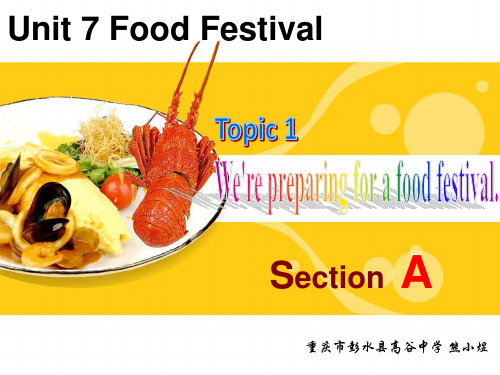
world.( T ) 4.Free the Children plans to build a school in Kenya.( T )
5.Kangkang will call Craig to get more information about
Thank You!
1b Listen to 1a and mark T(True) or F(False).
1.Craig is a twelve-year-old Canadian boy.( F )
2.Craig started Free the children to help poor
children.( T )
blind
adj.瞎的,失明的
In rural China, there are such a group of children——The Left-behind Children.Their parents go out to work in order to survive.They have to stay in the countryside, living with grandma and grandpa.They need our help.What can we do for them?Discuss and report your ideas to the class.The following information and pictures may help you.
Free the Children
Kenya
He is a very kind man. Now he is trying his best to build a new
Unit7Topic1 SectionA
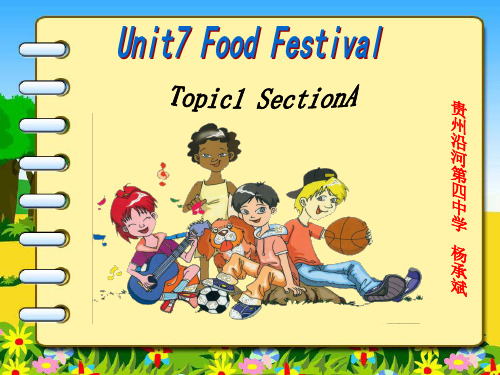
set the table write a song make a poster
1c
Group work
Discuss what the food festival will be like after the example.
Example: A: What will the food festival be like? Can you imagine it? B: I imagine (that) a lot of people will come to the food festival. C: …
1. know about 2. born 3. when and where 4. think about how
1. 2. 3. 4.
wrestling 1. village raise money 2. turn to I think 3. try our best to get in touch with
Daniel Igali a village in Nigeria an Olympic wrestling champion
Will Kangkang’s classmates help Daniel Igali? Yes, they will. What will they do? They will have s school.
I think we should ……
I imagine (that) a lot fo people will come to the food festival.
soup n. 汤
cheese n. 奶酪 pie n. 甜馅饼
pancake n. 薄煎饼
biscuit n. 饼干
- 1、下载文档前请自行甄别文档内容的完整性,平台不提供额外的编辑、内容补充、找答案等附加服务。
- 2、"仅部分预览"的文档,不可在线预览部分如存在完整性等问题,可反馈申请退款(可完整预览的文档不适用该条件!)。
- 3、如文档侵犯您的权益,请联系客服反馈,我们会尽快为您处理(人工客服工作时间:9:00-18:30)。
Unit7 Topic1 Section A1.know about 了解Do you know abou t you parents?2.be born 出生I was born in I was born in Yinjiang.3.I know he wants to build a new school for his poor village in Nigeria.是省略了that的宾语从句。
Say,think,hope,bilieve, imagine等4.I think money must be a problem for him. (同上)a problem for sb:5. Shall we to raise money for his school?have a food festival举raise money不定式表目的for his school表对象6. I think we can have it on our school playgrouond on Sunday.7. turn to sb : ask sb for help 向某人求助I’m going to turn to my teacher.= I’8.get in touch with 与……取得联系be/keep/stay in touch with与……保持联系9. on the Internet (在网上、电视、收音机上用on)10. I’ll think about how to organize the food festival.【疑问副词或代词+to do】作介词的宾语(on about);2. 【疑问副词或代词+to do】作动词(tell advise show discuss)的宾语○1He wrote a book on how to learn English well.○2I don’t know where to go next.11. do/try one’s best to do I’ll try my best to learn English well.12. What do you think you can do to help the people there?do you think在句中作插入语:1.其后接宾语从句,后面的一般疑问句要改成陈述句;2.如果去掉do you think,则要恢复为一般疑问句。
What can you do to help the people there?13. write to←→hear fr o m14. cheer …up一、单项选择。
1.The old farmer wants to build house ______ his son,but the money is ______ him .A. for; a problem toB. for; a problem forC. to; a problem forD. for; a question to2. The math problem is very hard , let’s ______ our math teacher .A. turn toB. turn onC. turn overD. turn off3. --- ______ and ______ shall we have a soccer game ?--- I think we may have it on our school playground on Saturday .A. When ; whereB. What ; whichC. Where ; howD. When ; how4. ---Do you think I am a good student? --- Yes , ______ .A. I don’t think soB. I think soC. they don’t think soD. they think so二、根据汉语提示完成句子。
1. English is very important for us , so we will ____ ____ ____ (尽力) to learn English well.2. I really want to ______ _____ ______ ______ (与……取得联系) my math teacher , but Idon’t know his phone number .3. I think that I can ______ _____ (写信给) them to cheer them up.4. I think that I can put on a show to ______ _____ (筹钱) them .Section B13. think of=think about思考,考虑think over认真思考What are you thinking about ? I’m thinking about the math problem.14. have a sweet tooth 喜欢吃甜食15. I think ( that )Chinese fried rice and Japanese sushi are easy to cook. (是省略了that的宾语从句。
)be easy to do Studying hard is easy to gwt high marks.16.What’s more,I’m sure that fried rice and dumplings will be popular.I’m sure that …引导宾语从句。
一个系动词+一个表示主观态度或意念的adj(或Vpp)可构成动词短语,在语法上相当于一个vt,后面可以跟一个由that引导的从句作宾语。
在adj(Vpp)和that从句之间不要插入介词.What’s more是固定结构“另外,还有,而且”.17. I think ( that ) beef curry is OK. (是省略了that的宾语从句。
)18. good enough enough修饰adj、adv 后置enough money enough修饰n 前置19.I believe ( that ) wu’ll raise a lot of money for Naniel Igali. (省that的宾语从句。
)20.decide (not) to do sth 决定(不)做某事I decide to learn English well.21.help sb (to) do sth He often helps me ( to ) learn English22.raise some /a lot of moneyWe may raise a lot of money by selling old books.23.invite sb to sp/do sth 邀请某人去某地/做某事Can you invite me to have lunch?24.have (no) time to do sth (没)有时间做某事I have ( no ) time to watch TV on Friday evening.25.Will you please …?后接V原形,表示语气委婉地征求对方建议.26.Will you please tell me how to learn English well .27. send sb sth=send sth to sb (give , pass , lend , write , show)make (buy , draw , sing , get ) sth for sbI’ll send you some beautiful pictures on the Internet tomorrow,OK?=I’ll send some beautiful pictures to you on the Internet tomorrow,OK?SectionC1. invite sb to/sp do sth May I invite you to come to my class meeting?2. over the phone = on the phone = by phone 通过电话I usually keep in touch with my uncle over the phone.3. hold on = hold the line = just a moment 稍等(别挂线)4. What’s up 另外,还有,而且5. What a surprise!○1What a smart girl (she is) !○2What + adj + CNs / UN + S + V ! What clever students (we are )!What bad weather( it is) !○3How + adj / adv + S + V ! How beautiful (you are ) !6. on May 16th on Sunday on Sunday morning on Saturday evening在具体的某一天或具体某一天的上午、下午、晚上都用介词on.7. be pleased to do sth ( nice , glad , happy )I’m pleased to play basketball with you.8. keep up保持,继续keep on go on continueKeep up your learning hard9 for sale 待售,出售Are these machines for sale?这些机器是要卖的吗?10. thank sb for sth Thank you for coming and seeing me .11. let ( have , make ) sb do sth Let me help you .12. supply sth to /for sb = supply sb with sth 提供某人某物The school supplies books to / for the children.= The school supplies the children with books.13. be pleased with I’m pleased with your smile .SectionD1. come true 变为现实I should learn hard to make my life dream come true.2. hear about sb/ sth 听说(被告知某事)hear of sb/ sth 听说( 主动得知)hear from sb 收到某人的来信3. be worried about 担忧,忧虑I’m worried about my English .4. decide to do sth5. and so on 等等○1---I’m pleased _____ hear that you went to Mount Tai for traveling . Are you pleased _____ everything there? ---Yes, of course.A. with ; withB. to ; toC. to ; withD. / ; for○2--- _____ surprise! So many people came for your mother’s birthday .A. What aB. WhatC. How aD. How。
